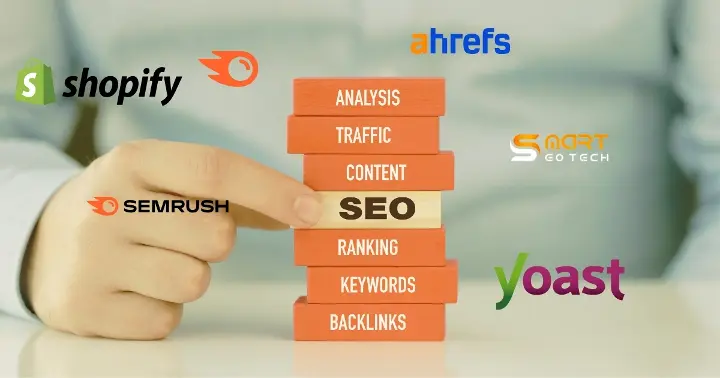Knowing the best SEO practices for Shopify is essential in optimizing your Shopify store effectively. With the right approaches and tools, suitable can optimize online visibility and attract organic traffic, influencing sales positively. Therefore, it is highly effective to implement any search engine optimization strategy in Shopify since it is necessary to increase online visibility and drive traffic to the e-commerce stores.
In this article, we will explain the best SEO for Shopify, using essential tools and checklists that help improve store performance in SERPs. In the next parts, we will follow keyword research, on-page optimization, technical SEO, and content creation. We also show you the best free SEO apps for Shopify and give you an exhaustive checklist to ensure you check anything. Whether you have just set up a Shopify store or have years of experience managing an online store, here you can find some actionable knowledge to fine-tune the SEO potential of your Shopify store.
BEST SEO FOR SHOPIFY

SEO And Shopify
Shopify is a very powerful SEO platform that comes preloaded with custom title tags and meta descriptions, automatic sitemaps, and much more. All this makes it easier for merchants to be more visible online. To take advantage of the power of SEO, make sure your product pages include keywords related to searches, are optimized for mobile responsiveness, and have wonderful content. Additionally, some of the correct SEO apps may highlight and possibly solve typical problems, but strategic link-building will always boost search rankings. Leverage those tools and strategies, and the performance of a Shopify user's store will be improved in searches.
What Is Shopify SEO?
In other words, Shopify SEO is a set of various practices and strategies that can be adopted to enhance the search engine result position of a Shopify store.
Why Does Shopify SEO Matter?
It may be easier to consider Shopify SEO as if it were actually your very own digital billboard—just much more advanced, of course. This is a surefire way to rank on the SERP when people are searching for the type of products that you sell. You are making your store more visible and putting your products right in front of potential buyers through perfecting your ShbyEO. It involves optimizing your site structure, product descriptions, meta tags, and so much more—many of which are targeted at striving to attract more organic traffic. With really strong Shopify SEO, your store can be catapulted to the top ranks, and thus, your shop will gain far more visibility and sales.
Shopify SEO for Beginners
Starts with Shopify SEO: Frighteningly Tough for beginners, but these easy steps will make it not so intimidating:
1. Understand Basic Concepts
Familiarize yourself with terms like keywords, backlinks, meta tags, etc., to give you a basic understanding in the realm of SEO principles.
2. Start with Keyword Research
Use free tools like Ubersuggest or even the Google Keyword Planner to find the most relevant words that your possible customers are using to find products like yours.
3. Optimize Your Store's Structure
Make sure your site is highly navigable with categories and collections that make it easy for visitors to find what they are looking for.
4. Focus on On-Page Optimization
Optimize each product page with unique descriptions containing targeted keywords while ensuring the title tags and meta descriptions are compelling enough to encourage a click from the SERPs.
5. Monitor Performance Regularly
Utilize Google Search Console to monitor how your store performs in search results and adjust accordingly based on the data you collect.
Shopify SEO Tools

1. Google Search Console
It is an outstanding tool and a must-have for every Shopiify store owner. It monitors your website's performance in Google's search results, thereby letting you understand when your store might appear in the searches and possible problems that affect its visibility. It literally means that by integrating your Shopify site with Search Console, your Shopify site can be crawled to detect crawling errors, track keyword performance, and even send notifications regarding critical issues that might have an impact on rankings.
2. SmartSEO
Smart SEO is a very good tool that enables your store to auto-optimize most of the tasks themselves. Meta tags and alt tags create themselves; the sitemap remains organized. Moreover, smart SEO also enhances page loading speed, a very important factor regarding user experience and rankings for search engines.
3. Shopify Yoast SEO
While known for WordPress, Yoast SEO has made its way into the Shopify ecosystem as well. This app helps you optimize product descriptions, blog posts, and other content by providing real-time feedback on keyword usage and readability. With Yoast SEO, you can ensure that content not only optimized for search engines but also engaging for users.
4. Plug-in SEO
Another one is called plug-in SEO, which is, in most aspects, comparable to Yoast but customized especially for Shopify users. It audits the SEO health of your store and gives actionable recommendations, allowing improvement in various parts, like title tags and meta descriptions, for example, and broken links. It's very good for beginners who need guidance on how to optimize their stores.
5. Ahrefs
Ahrefs would also be a very powerful tool for an all-in-one SEO solution that provides all the features one needs with Shopify. In keyword research and backlink analysis, it stands head and shoulders above the rest among many other competitive tools. Ahrefs could help find high-value keywords and track ranking over time, provided it has an enormous database and crawls the web fast.
6. Semrush
Semrush specifically gives a suite of tools that can be used to boost your Shopify store's online visibility. From tracking keywords to carrying out site audits, Semrush would give you insight into how you should progress in an optimization strategy for your SEO. It has an On-Page SEO Checker, which structures its recommendations to get pages boosted in ranking according to the trending of today.
7. Scretrendog
Screaming Frog is a web crawler that identifies the technological issue on your site that's having a negative impact on the SEO performance. It helps find broken links, duplicated content, and lost metadata, all of which, in the event that you do not recover them, can affect the ranking of your site pretty heavily.
8. Google Keyword Planner
Keyword research using Google Keyword Planner: A great tool for keyword research specific to any eCommerce site. Find high-value keywords with adequate search volume and low competition to ensure optimization for your product pages.
9. Image Resizer & Optimizer
Images would be the most important content material for an eCommerce site to be successful. The Booster SEO & Image Optimizer optimizes images so that they appear in Google Images, besides automatically generating meta tags and JSON-LD structured data.
10. Ubersuggest
Another good free tool is Ubersuggest, giving you keyword suggestions alongside some aspects of domain analysis. It helps you find out which keywords your competitors rank for, and alongside this, it gives you some traffic estimates.
Shopify SEO Checklist
If you want to cover all aspects of SEO for your Shopify store. This checklist ensures you cover all the areas necessary to fine-tune SEO for your Shopify store.
1. Keyword Research
- Using a tool like Google Keyword Planner or Ahrefs, identify target keywords.
- Focus on information or counseling keywords and commercial/corporate keywords related to your product.
2. On-Page Optimization
- Optimize title tags with your target keywords.
- Write such meta descriptions that will convince anyone to click on them.
- URLs must be clean and descriptive.
- This is achieved with alt text that carries applicable keywords for images.
- Write new product descriptions so that there is no duplication.
3. Technical SEO
- Set up Google Search Console and watch the site's performance.
- Regularly conduct site audits with tools like Screaming Frog.
- Make sure it is mobile-friendly; check at Google's Mobile-Friendlest.
- Compress the images and minimize scripts on this site to optimize its speed.
- Regular updates of the sitemap to the Google Search Console.
4. Content Creation
- Blog posts regularly target long-tail keywords.
- Ensure content is engaging and provides a gain for readers.
- Internal linking must be used to link relevant content on your site.
5. Backlink Building
- Reach out or collaborate with some influencers in your niche for guest blogging.
- Check the quality of the backlinks via Ahrefs or Semrush.
For indepth Guide Read: SEO Strategies & Trends (2025): A Guide
Best Free SEO Apps for Shopify
If you want to enhance your Shopify store without having to spend cash out of pocket, there are many free apps that can assist you with:
1. Plug-in SEO
This app performs periodic SEO checks of your store's health and offers a store specifically tailored to users on Shopify.
2. Smart SEO
This is an app that will automate optimization but with further features including multi-language support and instant page loading enhancement.
3. Booster SEO & Image Optimizer
This app would specialize in optimizing images, additionally autogenerating meta tags, a really key thing to increase visibility in image search-related queries.
4. JSON-LD for SEO
This is really an app meant for implementing structured data markup automatically on your product pages, thereby increasing how they appear in the search result.
5. TinyIMG
The compressed images, without losing their quality, are necessary to quicken the loading time.
Shopify SEO Checker
For you to know if you're making the cut or not, there's an SEO checker tool that helps evaluate your attempts at optimization:
1. Site Audit Tools
Carry out a health audit on your website using tools like Screaming Frog or Semrush. This will track all the problems in the form of broken links or missing metadata.
2. Performance Tracking
Daily/weekly check Google Analytics together with Google Search Console and evaluate traffic patterns and user engagement metrics over time.
3. Competitor Analysis
For instance, using Ahrefs or Ubersuggest to do competitor research and then finding out what keywords they have been targeting the most successfully.
Ending Words
Optimizing a Shopify store in 2025 requires an amalgamation of effective strategies and the right tools, specifically designed for eCommerce needs. With some of the most powerful tools available, such as Google Search Console or Yoast SEO if it's used, Smart SEO and/or Plug-In SEO, Ahrefs, Semrush, and the others above, will greatly increase online visibility.
Time spent keyword researching is sure to pay in the long run through increased traffic conversion. If you have the patience and are dedicated to these techniques while using the recommended applications effectively, you are certainly going to do the right thing, and over time you are on your way to achieving outstanding results using the very powerful Shopify platform!
Optimixia is an eCommerce SEO agency with a dedicated team of eCommerce SEO specialists who provide comprehensive SEO services tailored to enhance online visibility and drive organic traffic for your online store.